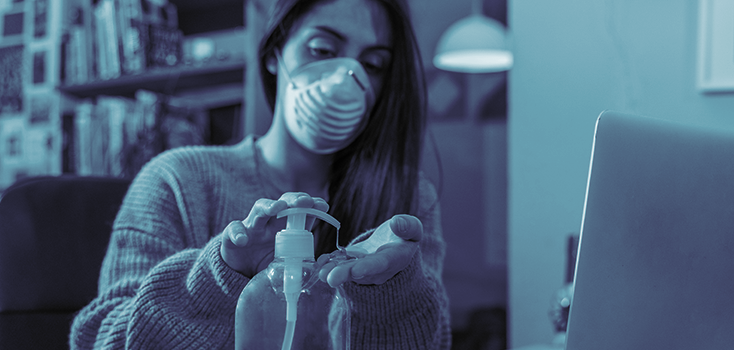
Common Myths about the Coronavirus
With the ongoing pandemic, more and more misinformation about the virus can be found online. Many myths place false hopes in means that do not help, or they present things worse than they are.
1. There already exists a functioning medicine or vaccination
To date, there is no specific medicine or vaccination recommended to prevent or treat the new coronavirus. However, some specific treatments are under investigation, and will be tested through clinical trials.
2. Antibiotics could treat the virus
Antibiotics do not work against viruses, only bacteria. Since the new coronavirus is a virus, antibiotics should not be used as a means of prevention or treatment.
3. Established vaccines against other viruses are effective against the virus
Established vaccines (like against pneumonia, such as pneumococcal vaccine) do not provide protection against the new coronavirus. The virus is so new and different; therefore, it needs its own vaccine.
4. Only anti-bacterial soap will protect against the virus
Washing hands is the most essential matter. Important is to clean your hands frequently with an alcohol-based hand rub or wash them with soap and water for at least 30 seconds. Anti-bacterial soap is actually not helpful at all, since corvid-19 is a virus.
5. The virus can be defeated by simple household measures
Old home remedies do not help. Some the following remedies are frequently mentioned online, but do not work either:
- Regularly rinsing the nose with saline
- Spraying alcohol or chlorine all over your body
- Simple usage of hand dryers without properly washing hands
- Taking long hot baths
- Consuming loads of “wonder-products” like garlic, vitamin C, essential oils, silver colloid, sesame oil, zinc, green tea or even cow urine
Homemade masks are not an effective protection against the virus, since common fabric is not impervious to viruses.
Homemade hand-sanitisers should also be viewed with caution: Internet solutions are often based on disinfectants for surfaces – and therefore not suited for the skin. Vodka is also not a solution, since it does not contain enough alcohol to kill off viruses.
6. Thermal scanners can effectively detect the virus
Thermal scanners are effective in detecting people who have a higher than normal body temperature. However, they cannot detect people who are infected but are not yet sick with fever. This is because it takes between 2 and 10 days before people who are infected become sick and develop a fever.
7. Only older people can be affected
People of all ages can be infected. However, older people, and people with pre-existing medical conditions (such as asthma, diabetes, heart disease) appear to be more vulnerable to becoming severely ill with the virus.
8. People from African descent cannot be affected
This is also not true, anybody can contract it. There exists no evidence of genetic resistance in those of African descent.
9. The virus cannot spread in hot or cold climates
There is no reason to believe that cold or hot climate can kill the new coronavirus (or any other diseases). True is, that some viruses, such as cold and flu viruses, do spread more easily in the colder months, but that does not mean that they stop entirely when conditions become milder. From the evidence so far, the COVID-19 virus can be transmitted in ALL AREAS, including areas with hot and humid weather.
10. A facemask will protect from the virus
The common available masks (surgical or home-made) are not capable of filtering the virus, while professional facemasks – specifically designed for protection against viruses – are generally only available to medical staff. However, facemasks are supposed to protect the environment from the (infected) wearer, not the other way around. If you have an acute respiratory infection yourself and have to move around in public places, any kind of mouthguard, even if it is made of fabric, can be useful to protect others from you.
11. Pets can spread the disease
Currently there are no proven cases that the virus can jump from pets to humans. Furthermore, there is little evidence that SARS-CoV-2 can even infect cats and dogs.
12. Mosquitoes can spread the disease
To date there has been no information nor evidence to suggest that the new coronavirus could be transmitted by mosquitoes
13. Packages or mail from China can spread the disease
Because of poor survivability of coronaviruses on surfaces, there is likely very low risk of spread from products or packaging that are shipped over a period of days or weeks at ambient temperatures.
Sources:
Who.int (2020): Coronavirus disease (COVID-19) advice for the public: Myth busters. URL at: https://www.who.int/emergencies/diseases/novel-coronavirus-2019/advice-for-public/myth-busters
Medicalnewstoday.com (2020): Coronavirus myths explored. URL at: https://www.medicalnewstoday.com/articles/coronavirus-myths-explored
Bbc.com (2020): coronavirus-more-myths-to-ignore. URL at: https://www.bbc.com/news/av/51979410/coronavirus-more-myths-to-ignore
Informationisbeautiful.net (2020): Coronaviruses Myths & Misconceptions. URL at: https://informationisbeautiful.net/visualizations/coronavirus-myths-mythconceptions/

